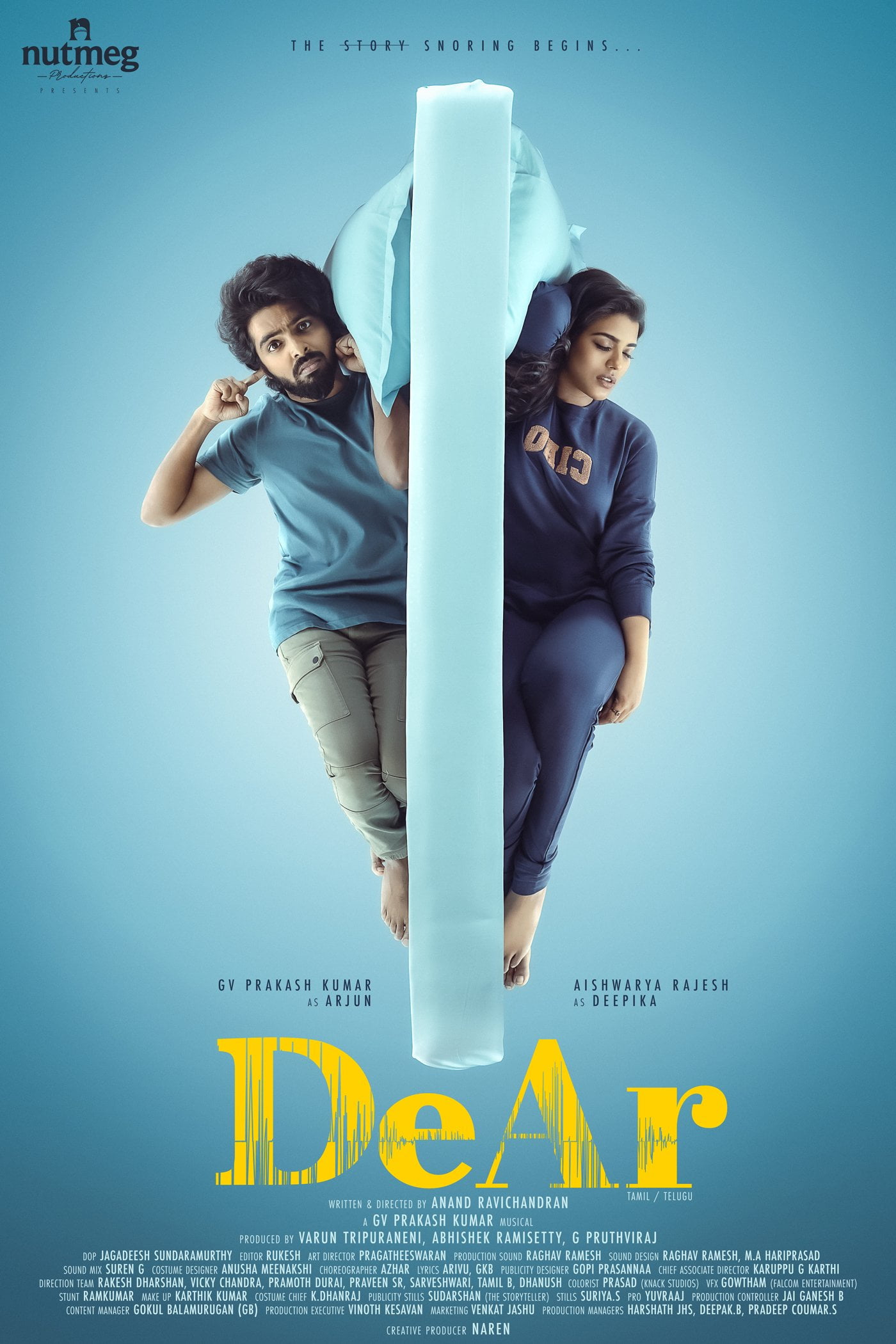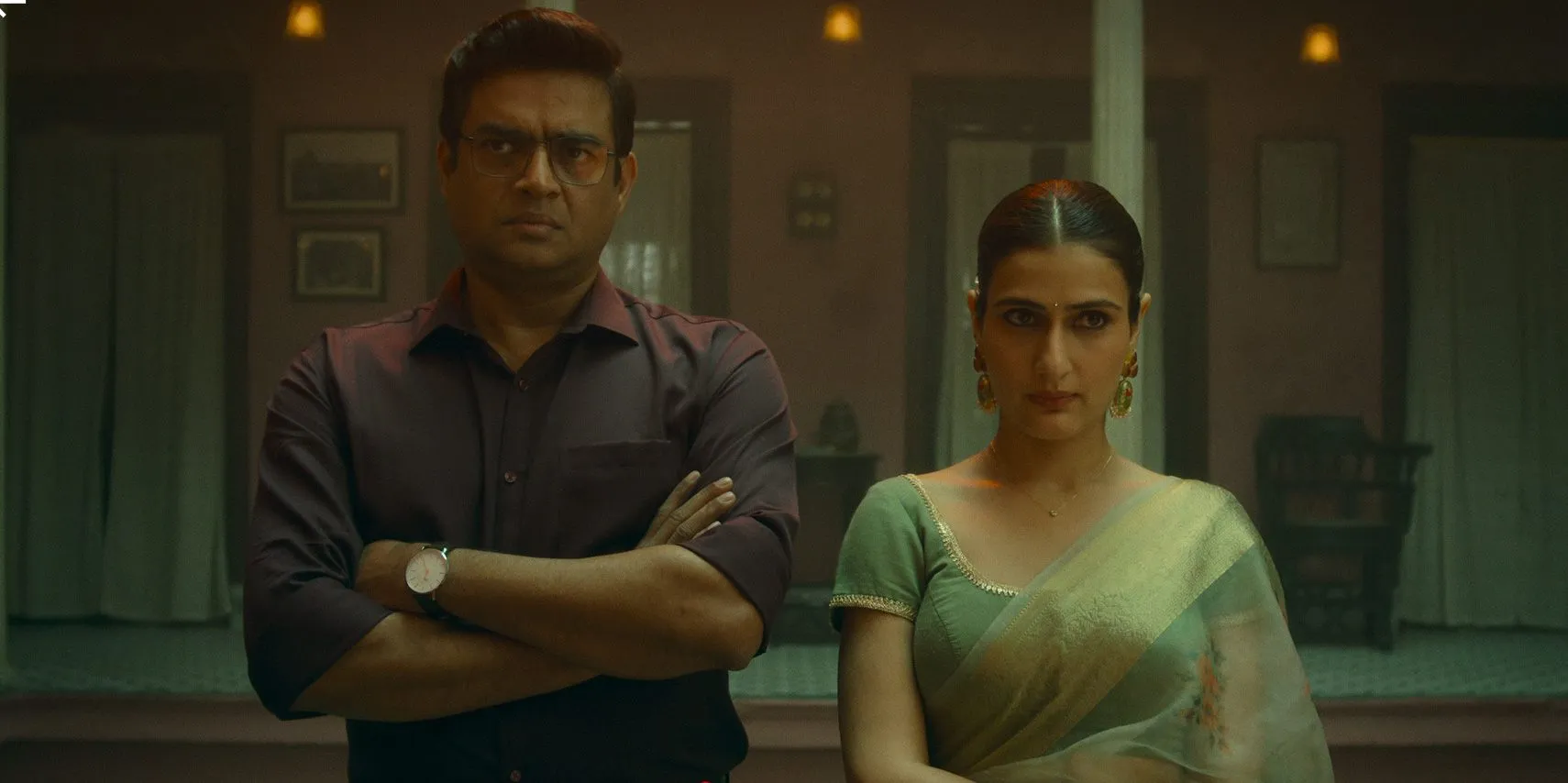The Tamil film DeAr (2024) by Anand Ravichandran is a recently released family entertainer focusing on personal growth and personal values. This is the second directorial undertaking of Anand Ravichandran after Sethum Aayiram Pon in 2019 which gathered much praise and attention for its making and story. The film is structured as a light one focusing on the post married life of a couple, Deepika and Arjun. The sleep apnea of the former impacts Arjun who decides to go for a divorce when his sleep and career both become trapped in the marriage. DeAr revolves around this divorce and the connected events in shaping different perspectives on the main characters. The film started receiving comments especially after its Netflix release.
The Tamil film DeAr (2024) by Anand Ravichandran is a recently released family entertainer focusing on personal growth and personal values.
DeAr is discriminately divided focusing on one theme at a time, while the first half is all about the sleep disruption and its adjustments, the second half is about the personal growth elements. Musical composer and playback singer G.V. Prakash and the popular Tamil actor Aishwarya Rajesh have done a decent endeavor in making the narrative reach to the audience.
Abortion and the silent gender oppression in DeAr
This is one of the most poignant points in DeAr where the focus is completely shifted to the female perspective of bodily autonomy. Though stated in a relatively mild and plain way, Deepika brings up that one’s body and the decisions concerning it are purely personal, not public. This decision does not have anything to do with anybody surrounding her even if it is her life partner or companion.
Deepika’s father says in DeAr, ‘It’s her life, her body, her decision. We don’t have any right to talk about it. . . Let the others ask. I will tell them. . . If someone laughs because my daughter stays at my home, let them. I don’t care. Her happiness is important to me.’ (56.01-56.55)
This is not an easy statement to be made in front of the target audience, since they hold motherhood so closely, culturally. Thus, this statement is evidently the next step in the Tamil film industry towards progress, although it is said in a lighter tone. Deepika’s words, when justifying her stand, that her child needs both the parents together and not separately defines the very need of the child in its fullness. During separation, it is commonly said that the child will get to live a normal life if both the separated parents remain connected with the child. DeAr has managed to break this shackle in bringing it up that a mentally healthy child is one who is managed jointly by the parents in an amicable scenario.
DeAr has managed to break this shackle in bringing it up that a mentally healthy child is one who is managed jointly by the parents in an amicable scenario.
The silent gender oppression meted out to the characters is spread throughout DeAr. Consider the character of Kalpana who is oppressed the most in the film, she is deemed to be a wife, servant and care taker. Her aspirations and goals are looked down upon by her husband as insignificant and unnecessary. She dreams to publish her short story book and is the least important to Saravana. He simply assumes that she is the happiest with him being the prefect. Kalpana is from a poor family and therefore, Saravana assumes that her living a materialistically sound life with him is what makes her happy.
When he is secretly nicknamed “Hitler” in his company, we realise he consciously rules his family as well. But his character is also not free from oppression, being the only hope of the family, he is thrusted with too much burden at a young age where upon he assumes the role of a dictator unconsciously.
Arjun, too, is oppressed within his family circle. Often he is made to compete with his elder brother, who is the perfect example set before him. Therefore, Arjun vies with him to gain respect and love from their mother in his professional life. Their mother, too, had to face this which forms the core of their common cause.
Parenting and growth of personal values
Lakshmi, lovingly called as Lakku, is the mother of Arjun and Saravana in DeAr. She, being separated from her beloved husband takes it upon herself to find financial and emotional stability. After a certain age, Saravana takes over these problems all by himself. After her husband runs away, Lakshmi loses her parenting direction. This helps Saravana take the reins of the family. He becomes the captain and leader who decides everything. Here, his overpowering attitude disables her parenting and eventually, impacts his personal growth.
Arjun on the other hand, develops an ego to compete with his brother to find an affectionate place in his mother’s heart. He has no other way than his profession to make his mother proud. Therefore, he aims to join a prestigious news channel as a TV anchor.
Arjun on the other hand, develops an ego to compete with his brother to find an affectionate place in his mother’s heart. He has no other way than his profession to make his mother proud.
When Saravana is dictating as an imprudent leader, Arjun goes on working tirelessly to pursue his career, in this process both of them lose track of their personalities and DeAr how it impacts the others living around them. Even when all these are known to Lakshmi, their mother is unable to correct her sons and she longs to live with her husband.
Forgiveness is foregrounded in DeAr
Throughout DeAr, none of the characters are focused on for most part of the film, sometimes the focus is on Deepika, while at other times it shifts constantly. Yet on close quarters, the focus is ultimately on the value of forgiveness and reconciliation.
Initially, Deepika becomes a symbol of forgiveness to Arjun and the rest of the family. Though separated, she remains connected with the family and chooses to preach forgiveness silently. Slowly, Arjun is convinced of this and through Lakshmi, Saravana and the entire family chooses forgiveness for their father who left them many years ago.
Forgiveness is thus treated as an essentiality especially when it comes to family life. But at the same time, through individual choices, the importance of the freedom of choice is also reiterated without diminishing its significance. It is very difficult to forgive, wait for and love someone who betrayed us once, but Lakshmi took this step against the wishes of her sons. Seeing this, Arjun also gives up his issues with Deepika since they are adjustable.
The director of DeAr has managed to produce a good film, but more careful consideration and focusing on a single character or some main characters could have given it a definite shape. Deepika is one of the deepest characters here besides Kalpana. Nevertheless, she is only depicted superficially. Kalpana and Lakshmi do not have much screen time and do not convey their emotions freely. If they could, this might have drastically impacted and improved the entire cinematic experience of the film.
Moreover, the parenting of Deepika as an independent and strong woman by her parents, mainly her father is never focused on in DeAr. If dealt with importance, it could have had a more enlightening impact. DeAr has also managed to cast away superstitions as a way of thinking which has nothing to do with one’s life. In conclusion, DeAr is worth the watch because G.V. Prakash, Aishwarya Rajesh and Rohini have stolen the show.
About the author(s)
Vidhu (she/her) is an emerging writer with Masters in English language and literature, keen on learning the politics of the world around her. She has dreams to create a career in journalism and writing, where she unburdens her self. She has a great taste for movies from varies geographical spans and pens down poetry in magical charms. She is open to projects or research centring on humanities.









